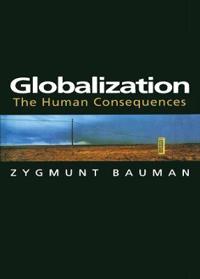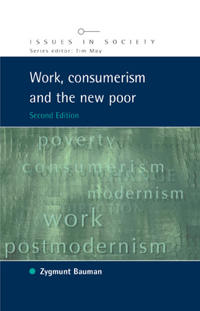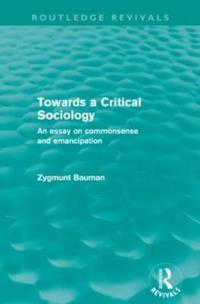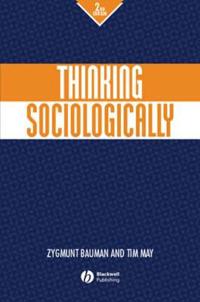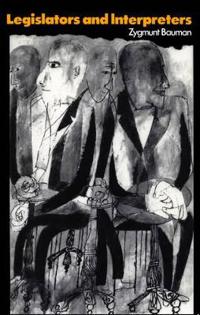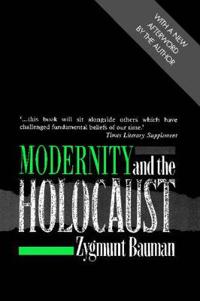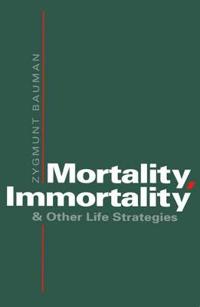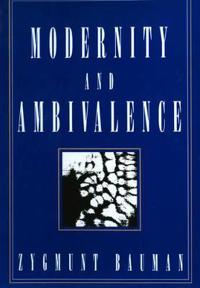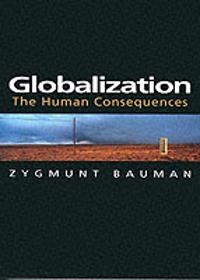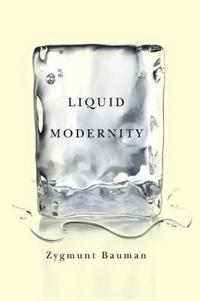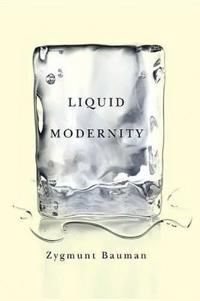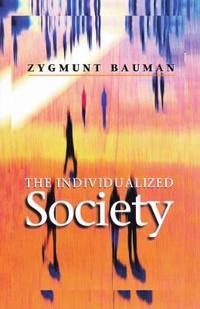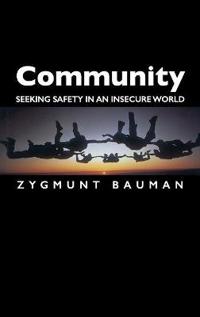Postmodern Ethics (Häftad)
avZygmunt Bauman, Bauman
ISBN: 9780631186939 - UTGIVEN: 199312Zygmunt Baumana s powerful and persuasive study of the postmodern perspective on ethics is particularly welcome. For Bauman the great issues of ethics have lost none of their topicality: they simply need to be seen, and dealt with, in a wholly new way. Our era, he suggests, may actually represent a [...]
Globalization (Häftad)
avZygmunt Bauman
ISBN: 9780231114295 - UTGIVEN: 200008The word "globalization" is used to convey the hope and determination of order-making on a worldwide scale. It is trumpeted as providing more mobility -- of people, capital, and information -- and as being equally beneficial for everyone. With recent technological developments -- most notably the In[...]
Work, Consumerism and the New Poor (Häftad)
avZygmunt Bauman
ISBN: 9780335215980 - UTGIVEN: 200409Reviewers' comments on the first edition: 'Zygmunt Bauman presents a cogently argued and compelling thesis...an important book from a distinguished scholar, that adds a new dimension to the poverty debate' - "British Journal of Sociology". 'It will be of great interest and value to students, teacher[...]
Intimations of Postmodernity (Häftad)
avZygmunt Bauman
ISBN: 9780415067508 - UTGIVEN: 199112This thoughtful and illuminating book provides a major statement on the meaning and importance of postmodernity.[...]
Towards a Critical Sociology (Pocket)
avZygmunt Bauman
ISBN: 9780415573108 - UTGIVEN: 2011-04For the better part of its history sociology shared with commonsense its assumption of the 'nature-like' character of society - and consequently developed as the science of unfreedom. In this powerful and engaging work, first published in 1976, Professor Bauman outlines the historical roots of such [...]
Thinking Sociologically (Häftad)
avZygmunt Bauman, Tim May
ISBN: 9780631219293 - UTGIVEN: 200108In this lucid, stimulating and original book, Zygmunt Bauman and Tim May explore the underlying assumptions and tacit expectations which structure our view of the world. The authors elucidate key concepts in sociology: for example, individualism versus community, and privilege versus deprivation. Wh[...]
Does Ethics Have a Chance in a World of Consumers? (Häftad)
avZygmunt Bauman
ISBN: 9780674033511 - UTGIVEN: 200905Zygmunt Bauman, one of the most admired social thinkers of our time, seeks to liberate us from the thinking that renders us hopeless in the face of our own domineering governments and threats from unknown forces abroad. He shows us we can give up belief in a hierarchical arrangement of states and po[...]
Legislators and Interpreters (Pocket)
avZygmunt Bauman
ISBN: 9780745607900 - UTGIVEN: 1987-12In this study the author argues that as the concept of verity has become increasingly contingent, the role of the intellectual has become interpretive rather than legislative. The book then assesses the implications of this change for today's culture.[...]
Modernity and the holocaust (Pocket)
avZygmunt Bauman
ISBN: 9780745609300 - UTGIVEN: 199111This work examines what sociology can teach us about the Holocaust, but more particularly concentrates on the lesson which the Holocaust has for sociology. Baumann argues that the Holocaust has to be understood as deeply involved with the nature of modernity.[...]
Mortality, Immortality and Other Life Strategies (Häftad)
avZygmunt Bauman
ISBN: 9780745610160 - UTGIVEN: 199210Zygmunt Baumana s new book is a brilliant exploration, from a sociological point of view, of the a tabooa subject in modern societies: death and dying. The book develops a new theory of the ways in which human mortality is reacted to, and dealt with, in social institutions and culture. The hypothes[...]
Modernity and ambivalence (Pocket)
avZygmunt Bauman
ISBN: 9780745612423 - UTGIVEN: 199309Modern civilization, Bauman argues, promised to make our lives understandable and open to our control. This has not happened and today we no longer believe it ever will. In this book, now available in paperback, Bauman argues that our postmodern age is the time for reconciliation with ambivalence, w[...]
Globalization - the human consequences (Pocket)
avZygmunt Bauman
ISBN: 9780745620138 - UTGIVEN: 199807a Globalizationa is a word that is currently much in use. This book is an attempt to show that there is far more to globalization than its surface manifestations. Unpacking the social roots and social consequences of globalizing processes, this book disperses some of the mist that surrounds the ter[...]
Liquid Modernity (Inbunden)
avZygmunt Bauman
ISBN: 9780745624099 - UTGIVEN: 2000-05In this new book, Bauman examines how we have moved away from a a heavya and a solida , hardware--focused modernity to a a lighta and a liquida , software--based modernity. This passage, he argues, has brought profound change to all aspects of the human condition. The new remoteness and un--reacha[...]
Liquid Modernity (Häftad)
avZygmunt Bauman
ISBN: 9780745624105 - UTGIVEN: 200006aeo A major new book by one of the most original thinkers today. aeo Develops a distinctive argument about the a liquida nature of modernity. aeo Re--examines key concepts which look at the heart of orthodox accounts of the human condition, including the concepts of emancipation, individuality,[...]
Liquid Love: On the Frailty of Human Bonds (Inbunden)
avZygmunt Bauman
ISBN: 9780745624884 - UTGIVEN: 2003-06-30Liquid Love: On the Frailty of Human Bonds (Häftad)
avZygmunt Bauman
ISBN: 9780745624891 - UTGIVEN: 200306* The latest book by Zygmunt Bauman, one of the most original and influential social thinkers of our time. * Offers an original analysis of the central figure of our contemporary, 'liquid--modern' times -- the man or woman with no fixed or durable bonds.[...]
The Individualized Society (Häftad)
avZygmunt Bauman
ISBN: 9780745625072 - UTGIVEN: 200102We are spurred into action by our troubles and fears; but all too often our action fails to address the true causes of our worries. When trying to make sense of our lives, we tend to blame our own failings and weaknesses for our discomforts and defeats. And in doing so, we make things worse rather t[...]
Community: Seeking Safety in an Insecure World (Häftad)
avZygmunt Bauman
ISBN: 9780745626352 - UTGIVEN: 200102This work takes a look at the tensions between ideas of community and individuality, and security and freedom. It offers a reappraisal of the concept of "community" - a concept that has become central to current debates about the nature and future of our societies.[...]
Conversations with Zygmunt Bauman (häftad)
ISBN: 9780745626659 - UTGIVEN: 2001-08A set of interviews with one of the world's leading social thinkers, ranging from autobiographical reflection to guidelines for developing the reader's understanding, this text also gives important background information on the assumptions of Bauman's groundbreaking work.[...]
Wasted Lives: Modernity and Its Outcasts (Inbunden)
avZygmunt Bauman
ISBN: 9780745631646 - UTGIVEN: 200312The production of a human wastea -- or more precisely, wasted lives, the a superfluousa populations of migrants, refugees and other outcasts -- is an inevitable outcome of modernization. It is an unavoidable side--effect of economic progress and the quest for order which is characteristic of moder[...]
Wasted Lives: Modernity and Its Outcasts (Häftad)
avZygmunt Bauman
ISBN: 9780745631653 - UTGIVEN: 200312The production of a human wastea -- or more precisely, wasted lives, the a superfluousa populations of migrants, refugees and other outcasts -- is an inevitable outcome of modernization. It is an unavoidable side--effect of economic progress and the quest for order which is characteristic of moder[...]
Identity: Coversations With Benedetto Vecchi (Inbunden)
avZygmunt Bauman
ISBN: 9780745633084 - UTGIVEN: 2004-08-31Identity: Coversations With Benedetto Vecchi (Häftad)
avZygmunt Bauman
ISBN: 9780745633091 - UTGIVEN: 2004-08-31Europe: An Unfinished Adventure (Inbunden)
avZygmunt Bauman
ISBN: 9780745634029 - UTGIVEN: 2004-12-31


